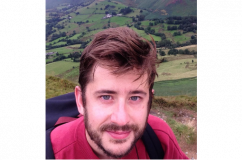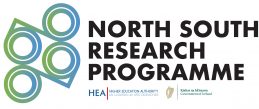Ferdinand Levy: A Jamaican poet in Dublin
Toggle
In 2022, Dr Gail McConnell of Queen’s University Belfast and I were awarded North-South Research Programme funding for Our Roots Travel Widely: Beyond Regionalism and Nationalism in Irish Poetry (BRAN). The project also funded a postdoctoral researcher, poet Dr Julie Morrissy, to research the period.
In this project, we aim to provide a radically new paradigm for thinking about culture, identity, and politics on the island between 1920 and the late 1960s. Like Bran, the voyager of Irish legend, our project hoists anchor and sails out from familiar territories, the dominant critical narratives of Irish poetry of the period in which regionalism and nationalism operate as exclusive poles within a fractured and traumatised cultural scene. A major impulse of the project was the recovery of marginalised voices: women, minorities, those with political affiliations outside unionism and nationalism, migrants, and visitors to the island.
In its early stages, I happened across Ferdinand Levy, a name unknown to me. Appearing in Eithne Strong’s poetry Quartos from 1943-1944, his poem, ‘Harlem Depression’, about race and discrimination, and featuring a racist Irish American cop, seemed entirely unlike anything else in Irish poetry of the period. With mounting enthusiasm, I soon began to piece together the details of the poem’s author, his life and literary work.
Born in Jamaica in 1904, Ferdinand Levy lived for almost two decades in Dublin while studying medicine at Trinity College Dublin. He is in all likelihood the first black poet published in Ireland. His only book of poems, Flashes from the Dark, was published in Dublin by Colm O’Lochlainn’s Three Candles Press in 1941. Levy eventually became a Medical Officer of Health for the Parish of St. James, Montego Bay in Jamaica where he died in 1972. He lived in New York in the late 1920s, bringing something of the Harlem Renaissance to Lower Baggot Street.
Senator John Harold Douglas, at whose wedding Levy served as a groom, described his friend in an obituary in The Irish Times as “a well-known personality” in 1930s Dublin, “patron of the arts, and a poet of no small merit”. Columnists leave impressions of a “trim, immaculate figure with… long, thin cigarette holder”, an ‘inveterate first nighter… quite a character in cosmopolitan Dublin’.
Levy had many passions besides poetry: he co-founded the Dublin Gramophone Society, and he was an art collector of major Irish painters, including Mainie Jellett, Paul Henry, and Louis le Brocquy. The latter painted Levy’s portrait in 1939.
During the 1930s, Levy was President of the Association for Students of African Descent (ASAD) in Dublin. Members included future Nigerian statesman and jurist, Jaja Wachuku, and New York ENT specialist and McArdle prize-winning surgeon, the Trinidadian Errol A. Thompson. As President of the Association, Levy hosted singer and activist Paul Robeson in his Baggot Street flat during Robeson’s 1935 visit to Ireland. ASAD held meetings in the Quaker Friends’ Meeting House on Eustace Street, with talks on racial justice, the expropriation of land in Kenya by white settlers, broadcasts delivered via Radio Éireann, and dinners held in the Country Shop, St. Stephen’s Green.
Levy also explored Irish racism in his poetry. In ‘Down O’Connell Street’, he turns the main shopping thoroughfare of Dublin into an arena for racialized sexual neurosis. The poem ends in an explosive revision of the blues refrain quite unlike anything else in Irish poetry of the period:
I saw her walking
Down O’Connell Street—
Lord, Lord!—
Down O’Connell Street.
The wind was sharp;
She dared not creep—
Lord, Lord!—
Down O’Connell Street.
All dressed in green
From head to feet—
Lord, Lord!—
Down O’Connell Street.
I saw her turn
With a graceful sweep—
Lord, Lord!—
Down O’Connell Street.
The smile she smiled
Was indiscreet—
Lord, Lord!—
Down O’Connell Street.
Would Gold I knew
The doll who smiled
But dared not speak—
Lord, Lord!—
Down O’Connell Street.
I’d make her know
That tropic love is sweet.
Lord, No!—
Not down O’Connell Street.
As a poet, Levy helps us rethink our sense of Ireland’s relationship to immigration: we tend to place greater emphasis on outward migration, with inward migration a recent phenomenon in the so-called “New Irish”; but migrant populations have been a part of Ireland’s history for longer than we might think. With that comes fascinating perspectives on global anticolonial solidarities, questions of cosmopolitanism versus nationalism, and perennial struggles against racism and discrimination.
Despite favourable reviews from luminaries such as Austin Clarke, Levy has failed to garner more than a footnote in Irish literary history, until now. On St Patrick’s Day, 17 March 2024 at 4.30pm, BBC Radio 4 is scheduled to broadcast ‘A Jamaican Poet in Dublin’. Presented by poet Jason Allen-Paisant and produced by Claire Cunningham of Rockfinch Ltd, the feature will examine the life and poetry of Ferdinand Levy, and include discussions with his daughter and with me on his rediscovery during the North-South Programme research.
Main photo: Portrait of Ferdinand Levy, 1939 by Louis le Brocquy; © The Estate of Louis le Brocquy (b&w photograph print)
The BRAN team gratefully acknowledges North-South Research Programme funding via HEA Ireland and the Department of Taoiseach's Shared Island unit.

